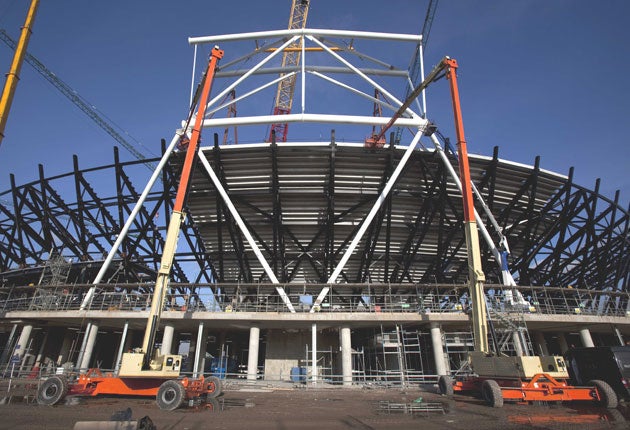Taxpayer faces bigger bill for 2012 Olympics

Your support helps us to tell the story
From reproductive rights to climate change to Big Tech, The Independent is on the ground when the story is developing. Whether it's investigating the financials of Elon Musk's pro-Trump PAC or producing our latest documentary, 'The A Word', which shines a light on the American women fighting for reproductive rights, we know how important it is to parse out the facts from the messaging.
At such a critical moment in US history, we need reporters on the ground. Your donation allows us to keep sending journalists to speak to both sides of the story.
The Independent is trusted by Americans across the entire political spectrum. And unlike many other quality news outlets, we choose not to lock Americans out of our reporting and analysis with paywalls. We believe quality journalism should be available to everyone, paid for by those who can afford it.
Your support makes all the difference.The taxpayer may end up paying to build every major venue in London's 2012 Olympic Games because private finance has dried up, the chairman of the Olympic Delivery Authority admitted yesterday.
John Armitt said it was possible that no private sector money would be found for the £1bn Olympic village in the heart of the park, the most high-profile victim of the global downturn which has already cost the taxpayer £326m more than was planned for.
The authority has already given up hope of securing funding for the £355m international media centre, which will now be paid for entirely by the Exchequer. In total, £496m has already been used from the £2bn contingency fund set aside for the project.
In an interview with The Independent, Mr Armitt admitted yesterday that there remained a chance that the no private money at all would be found for the Olympic village.
"Clearly, if we finally finished up with no private sector investment in the village, that would require a further contribution from the public sector," Mr Armitt said.
"At the moment we're still in negotiation, and we're still optimistic that we'll get to a point where we've got a private sector offer on the table and contribution to the village."
Nevertheless, Mr Armitt confirmed that the ODA could not "rule out" a complete failure of private sector funding for the village. "There remains an outside chance and it's a risk which at the end of the day will be properly considered between us and the Government," he said.
Savings that could reduce the cost of the village by up to £100m are currently being sought. When first planned, the site, which will comprise apartments, shops, restaurants and cafes, was going to be entirely funded by the private sector.
Over the past 18 months that figure was revised downward to half the total cost of the project. But because of the global downturn, Lend Lease, the Australian firm that is preferred developer for the project, has been unable to secure credit for the scheme.
As a result, the number of flats in the village, which will house 17,000 athletes and officials during the Games before being sold off, has been scaled down from an initial figure of 4,500. Yesterday Mr Armitt revealed for the first time that the final number of flats will be 2,873, meaning that athletes will have to be housed five to an apartment rather than four.
Mr Armitt, a former chief of Network Rail and Railtrack, also said the Olympic organisers were alive to the possibility that not all their contractors would survive the downturn. "Will we get through the next two years without any of our key suppliers getting into difficulty and us having to replace them? That's clearly a risk now that is greater than it has been," he said.
But he added that the impact of the global downturn on the Games has not been entirely negative. A sharp fall in the price of commodities such as steel, timber and concrete has led to significant efficiencies across the project, albeit that they have been offset by the weakness of the pound and the early purchase of steel for the Olympic stadium and Aquatics centre.
Progress on the stadium, whose capacity will be reduced from 80,000 during the Games to 25,000 afterwards, continues apace. Over the past few weeks the first parts of the stadium roof have been put into place.
Funding for eight minor sports, meanwhile, has been slashed because of a £50m budget shortfall in UK Sport, the body set up to distribute Lottery funding to elite sport. Shooting, water polo and handball were among those hardest hit.
Join our commenting forum
Join thought-provoking conversations, follow other Independent readers and see their replies
Comments